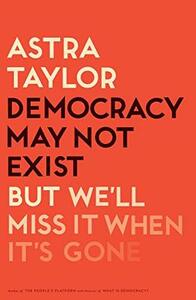Take a photo of a barcode or cover
informative
slow-paced
Definitely meant to provoke conversation. I didn’t agree with everything, but that seems to be the point of the “two ideas in tension” model of each chapter. That framework was my favorite part of the book
challenging
informative
reflective
medium-paced
informative
reflective
medium-paced
informative
This tried to include anything and everything in connection to democracy, even if briefly. Wish it had been tighter and more focused. The end also felt weak and rushed after all of the topics discussed.
challenging
hopeful
informative
inspiring
reflective
medium-paced
fast-paced
An absolute must read. We often think of democracy as a single act of voting, while being less aware of myriad of other forces that define who and why yields real power and to what end. From unequal access to education even in the rich countries with public education systems that look excellent on paper to unelected international financial institutions and multinational corporations that have more power over our lives than presidents and congressmen. Really really compelling read, in a clear and illuminating language. Make sure you have your highlighter at hand - you will want to underline a lot of passages and ideas.
As an aside, I checked out this book from my library on "3M Cloud Library," which I heartily anti-recommend. On top of the annoyance of only being able to read on my phone, the reading interface is clunky and very slow, not nearly as good as even the Kindle phone app. However! This book was good enough that I persisted in reading, when I think I would have given up on many other books.
I wasn't certain how strong of a book this would be since it seems to be a companion piece to Taylor's recent documentary (which I haven't yet seen, but the book made me more interested to watch). But it very much does stand on its own. The book is structured in an interesting way, with each chapter discussing the tension between two seemingly opposing principles that have to stand in tension in a democracy--for example, freedom vs. equality, majority rule vs. expert opinion, etc. Each discussion is far-ranging yet also fairly focused and self-contained. Taylor integrates a variety of interesting topics, including for example what we know about governance structures on pirate ships. She also does a good job of complicating principles that might seem simple on their faces--for example, by touching on ways that including previously excluded groups in a polity can be done in ways that are both good (expanding the vote to women) and bad (de-recognizing the sovereignty of Native tribes).
Of many good parts, I think my favorite part of this book was Taylor's serious discussion of the Athenian practice of sortition, or assigning governmental offices by random draw. She provides a very compelling discussion of the specific reasons the Athenians had for favoring this method as more democratic than elections, and makes some intriguing comments on how such a system would completely revamp many aspects of our society (such as education). Taylor argues fairly convincingly that ancient Athenians would not recognize the current American system of government as a democracy. At the same time, she is definitely not putting Athens on a pedestal, and acknowledges the many ways that they also fell short of democratic ideals. As the title says, Taylor's view is that no society has achieved the ideal of democracy, but many may have something to teach us as we struggle to salvage and improve our own.
I think this would be an awesome book to use to structure a college course!
I wasn't certain how strong of a book this would be since it seems to be a companion piece to Taylor's recent documentary (which I haven't yet seen, but the book made me more interested to watch). But it very much does stand on its own. The book is structured in an interesting way, with each chapter discussing the tension between two seemingly opposing principles that have to stand in tension in a democracy--for example, freedom vs. equality, majority rule vs. expert opinion, etc. Each discussion is far-ranging yet also fairly focused and self-contained. Taylor integrates a variety of interesting topics, including for example what we know about governance structures on pirate ships. She also does a good job of complicating principles that might seem simple on their faces--for example, by touching on ways that including previously excluded groups in a polity can be done in ways that are both good (expanding the vote to women) and bad (de-recognizing the sovereignty of Native tribes).
Of many good parts, I think my favorite part of this book was Taylor's serious discussion of the Athenian practice of sortition, or assigning governmental offices by random draw. She provides a very compelling discussion of the specific reasons the Athenians had for favoring this method as more democratic than elections, and makes some intriguing comments on how such a system would completely revamp many aspects of our society (such as education). Taylor argues fairly convincingly that ancient Athenians would not recognize the current American system of government as a democracy. At the same time, she is definitely not putting Athens on a pedestal, and acknowledges the many ways that they also fell short of democratic ideals. As the title says, Taylor's view is that no society has achieved the ideal of democracy, but many may have something to teach us as we struggle to salvage and improve our own.
I think this would be an awesome book to use to structure a college course!
An interesting premise with a very boring execution. This book was so long and it took a lot of words to explain concepts that could have been more concise. I also don’t think the chapters had a lot of structure or focus on a certain topic. The chapters are framed with juxtaposing concepts (such as freedom/equality and expertise/mass opinion) and really only the first chapter followed through on exploring those concepts as the main focus of the chapter. The rest of the chapters briefly mentioned the concepts at the end to try and tie an otherwise unorganized chapter together. There were definitely a lot of good ideas here but this book lacked structure and purpose, there are definitely better books to read on the topic of democracy.




